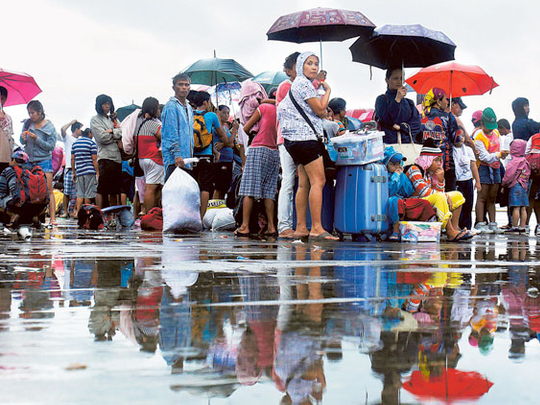
Dubai: Messages on scraps of paper, torn cardboard and paper plates. In a last-ditch effort to reach out to relatives, that was how survivors of Typhoon Haiyan—without access to electricity or telecommunication services—sent word out regarding their condition.
The handwritten messages were sent through a reporter of Philippine TV network GMA in the province of Leyte, one of the areas hardest hit by the typhoon. The messages offered a glimmer of hope to many who have been unable to contact relatives after Haiyan, locally known as Yolanda, ravaged the country, destroying homes, roads, power and telecommunication lines. The message was clear: Calamities can break down everything, except the human spirit.
“We are all alive! Palacio family,” read one message on a torn-up cardboard.
A message to Merjie Margallo of Dubai and Gerundo Moreto Jr of Saudi Arabia read: “Brother, we are okay. We are all alive. Don’t worry. Only the house and our things were lost.”
A few messages contained people’s full names and just one word: “Alive”.
However, not all messages were hopeful. Many called for help, saying resources were getting scarce and they needed food and clothes. Others delivered more bad news.
A message to Nora Fabi, Corazon Fabi and Wendyliza Fabi of Abu Dhabi listed 13 survivors from the family, but said: “We regret to inform Mana Corazon Fabi that Vito ‘Butsoy’ Mendiola is dead. BJ Mendiola is missing. Marcelo Mendioal is also dead.”
A message from Ritchel Almenar to Emelia Cuartel of Kuwait said: “Ma, Arwel, my sibling and three cousins are missing. Ma, I need your help. No food, clothes.”
A couple wrote this message for Keith: “This is Stephanie, our house was destroyed by the typhoon. baby almost drowned but thank God she is safe and we are all safe. We need help from you. We don’t have shelter we are in evacuation center this time.”
It has been days of uncertainty for victims in the Philippines and their families abroad, with very little news or information regarding the plight of families and friends in typhoon-hit areas. Damaged roads and communication links have made it difficult for officials, rescuers, volunteer groups and even the local media to reach many areas, hampering report, rescue and relief distribution efforts.
Several Dubai-based residents of Guiuan in Eastern Samar, which was the first to be hit by Haiyan, have taken to Facebook to call for media and government attention to their province. With power lines still out in Samar, they haven’t been able to contact their family since the typhoon made landfall. Forecasters said Haiyan was one of the strongest typhoons in world history. As of Monday, the confirmed death toll was 942, with 275 people reported missing.











